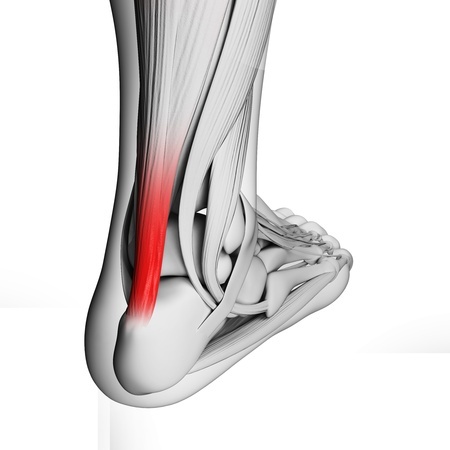Achilles Tendonitis: Symptoms, Causes, Risk Factors
Did you know that the Achilles tendon (strong fibrous tissue that attaches the calf muscle to the back of the heel bone) is the largest tendon in the body? Without proper functioning Achilles tendons, we wouldn’t be able to walk or run! And because it is so involved in our daily lives as well as in the movements that playing sports entails, it’s also one of the most likely tendons to be inflamed or injured/ruptured.
Inflammation of the Achilles tendon is called Achilles Tendonitis. Depending on the location of the inflammation, middle or lower part of the tendon, it is classified as noninsertional or insertional Achilles tendonitis; the “insertional” part describes whether or not it’s affected at the part that inserts into the heel bone). Noninsertional Achilles tendonitis tends to occur in younger active people, while Insertional Achilles tendonitis can occur to non-active people as well, and is often accompanied by a bony spur.
Symptoms include:
- Tenderness and/or stiffness of the Achilles tendon, especially when you wake up.
- Thickened portions of the tendon (a bump), where tissues may be tearing.
- Swelling or pain that gets worse with activity or after activity.
- Pain the day after exercising.
- Bone spur where the Achilles tendon meets the heel bone.
Causes of Achilles Tendonitis:
- Not warming up before vigorous exercises, such as sprints or hill climbs.
- Sudden changes in the intensity of exercise.
- Wearing the wrong footwear, such as worn down or unsupportive shoes, while exercising.
- Constantly running on hard pavement (increasing impact on the Achilles tendon) or uneven surfaces (straining the tendon and forcing it to flex more normal).
- Flat feet, over-pronation, and/or fallen arches can put more strain on the Achilles tendon as it stretches and flexes at an angle.
- Bone spurs can rub against the tendon, causing tears and inflammation.
Risk Factors:
- It’s more likely to affect men than women.
- The Achilles tendon weakens with age, so you’re more likely to experience it as you get older.
- Those with flat feet or fallen arches are more likely to be affected.
- Those with psoriasis or high blood pressure are at higher risk.
- Side effects of certain medications, such as fluoroquinolone, include increased the risk of being affected by Achilles tendonitis, even after they stop the medication.
If you think you or your family member is being affected by pain from Achilles tendonitis, make an appointment to see our board-certified podiatrist, Dr. Brandon Macy at Clark Podiatry Center. He can assess your feet and give them the treatment or orthotic support they need. Come see him at our Clark, NJ office.






